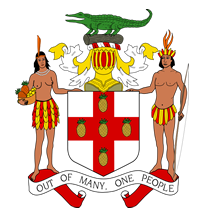The island - discovered by Christopher COLUMBUS in 1494 - was settled by the Spanish early in the 16th century. The native Taino, who had inhabited Jamaica for centuries, were gradually exterminated and replaced by African slaves. England seized the island in 1655 and established a plantation economy based on sugar, cocoa, and coffee. The abolition of slavery in 1834 freed a quarter million slaves, many of whom became small farmers. Jamaica gradually increased its independence from Britain. In 1958 it joined other British Caribbean colonies in forming the Federation of the West Indies. Jamaica gained full independence when it withdrew from the Federation in 1962. Deteriorating economic conditions during the 1970s led to recurrent violence as rival gangs affiliated with the major political parties evolved into powerful organized crime networks involved in international drug smuggling and money laundering. Violent crime, drug trafficking, and poverty pose significant challenges to the government today. Nonetheless, many rural and resort areas remain relatively safe and contribute substantially to the economy.
Jamaica is a parliamentary democracy under a constitutional monarchy and part of the Commonwealth realm.
Members:
Resources
Displaying 51 - 55 of 77Kingston and St. Andrew Corporation (Removal of Sand and Gravel) Regulations, 1956.
These Regulations provide rules for the removal of sand and gravel in the Corporate Area of the Kingston and St. Andrew Corporation. Removal of sand, gravel or other material from watercourses or river beds requires a licence from the Council of the Corporation to be granted in accordance with these Regulations.
Implements: Kingston and St. Andrew Corporation Act. (2010)
Farm Loans Regulations, 1965.
These Regulations implement provisions of the Farm Loans Act regarding restrictions on loans, maximum time of repayment, default in repayment, etc. The Regulations also prescribe various forms for purposes of the Act.
Implements: Farm Loans Act. (1976)
Registration (Strata Titles) Act.
This Act makes provision for the division of real property in strata lots, defines rights of common ownership and related rights in relation with a strata plan, and provides for administration of common property and the registration of strata titles.Land under the operation of the Registration of Titles Act may be subdivided into strata lots in accordance with a strata plan registered by the Registrar of Titles in the manner provided by this Act. The proprietors of all the strata lots contained in any strata plan shall, upon registration of the strata plan, become a body corporate.
Agricultural Small Holdings (Crop-sharing) (Bananas) Regulations.
These Regulations prescribe that, for the purposes of subsection (2) of section 7 of the Agricultural Small Holdings Act, the provisions of subsection (1) of that section shall not apply to any contract of tenancy of not less than five years, allowing the landlord to receive as consideration for such contract not more than of one-third of any crop of bananas grown upon the land to which such contract relates. Section 7 of the Act places restrictions on crop-sharing in relation to tenancies.
Implements: Agricultural Small Holdings Act. (1997)
Crown Property (Vesting) Act.
This Act makes provision for the appointment of the Commissioner of Lands and the vesting of Crown property in the Commissioner. The Act also provides for the incorporation of the Accountant-General and the holding and disposal of land by the corporation. The Act defines rights in respect of petroleum or minerals severed, pursuant to other legislation, from the land vested in the Commissioner.
Amended by: Crown Property (Vesting) (Amendment) Act, 2013 (No. 23 of 2013). (2013-10-30)


